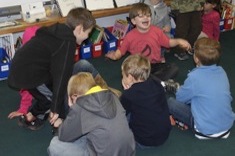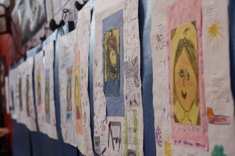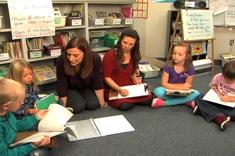Almost two years ago I started a writing group. I knew if I wanted to keep writing, then I needed a group of other writers to hold me accountable. I didn't want to be floating in the vast ocean of words without others to anchor me.
During our first meeting we huddled around a tiny table in the lobby of a hotel and shared our writing plans. As I listened to the others share, I soon realized it wasn't accountability that I needed, but rather people to celebrate the little moments of being a writer. Unable to contain myself, I declared, "No matter what, we will celebrate the little things." This group wasn't going to be about publication. It was about being a writer, collecting words and stories and ideas and research and putting those things on the page. It wasn't about a product. It was about a way of life.
Celebration became our anchor. In fact, it soon became the only "rule" for our writing group — we would celebrate together. When an idea for a book pricked at the edge of someone's mind, we celebrated. When a member decided to make a list of agents to maybe, someday, perhaps contact, we celebrated. When someone finished a chapter or even if they didn't, but they thought about a new angle for their character or tried a new genre, we celebrated. In fact, most of our time is spent in celebration.
Now that doesn't mean party hats and cupcakes and those little horns that unroll as you blow. Celebration, the kind that is the core of a writing life, is much more than fluff, and usually it's a lot quieter. It wraps around our minds, pulling us back to our notebooks. Celebration nourishes and nudges and makes us stronger writers.
I've come to realize three factors make a genuine celebration. First, a response is needed. Another person reads my writing and then responds with their thoughts. The more specific the response, the more it impacts me as a writer. The response nudges me to gain insight into my writing and into my writing process. This leads me into reflection, a second component of a genuine celebration. It is essential to reflect on my writing and my process in order to develop as a writer. Finally, when the response and reflection come together, I'm able to rejoice in my writing life. I find new energy through genuine celebration and am more connected to my writer self.
Too often in our writing workshops, we look at celebration as a way to wrap up a unit and share published writing. Although publishing is defined as the end of the writing process, for most writers, this isn't an essential step. Publishing is the icing on the cake. If you read any book for writers, the advice you will certainly find is to not think about publication. A sure fire way to fail as a writer is to write only for publication.
Many writing workshop teachers have adopted the advice of Donald Graves to "teach the writer, not the writing." However, when it comes to the end of the unit, we put a massive amount of attention on the writing during a celebration, and the writer fades to the background. In schools, when writing celebrations focus on a published piece, we take the emphasis off the writer and put it on the writing.
By shifting our focus during a celebration to responding, reflecting, and rejoicing in our work as writers, we place our attention back on the writer. A celebration doesn't have to be a formal end of a unit giant shebang. Instead, celebration can infuse writing workshop as writers celebrate their work together as a community. In order to make celebration a routine in writing workshop, consider some ways to respond, reflect, and rejoice as writers.
Respond: Writers can get either oral or written response to their writing. It takes time to develop the skills to give a meaningful response. During our conferences, we model responding to writers. In order to encourage students to respond to each other, we can pair them in partnerships that stay the same over time. Here they can practice and gain experience in giving meaningful feedback. As students become more proficient in giving response, they can then meet with a larger group of writers or offer written feedback to one another.
Reflect: When writers are given response, they then consider what to do with the feedback. What kinds of changes are they going to make to their projects? How will they proceed? What else do they need to do to continue working? This kind of reflection is necessary to the vitality of writing projects. Writers also need a chance to reflect on their writing process. What works best when planning a project? How will you overcome a drafting dilemma? What is the most meaningful revision? By either talking through a reflection or writing one, students are able to tap into this component of celebration and grow as writers.
Rejoice: This can be as simple as a smile or a high five. It is sharing the delight of writing. It is important to rejoice over the things students are doing as writers, as opposed to perfect pieces of writing. For example, when Emilie, a third grader, started drafting with periods, we celebrated. A few weeks earlier her drafts were void of ending punctuation. Now she was using periods as she drafted. Emilie is still not conventional with her use of periods, but she is one step closer. This is cause for cheer. We didn't eat a cupcake, but we did smile and rejoice. Emilie, like other writers who experience genuine celebration, is now fueled to keep writing.
As we infuse our workshops with celebration, the daily grind of writing becomes possible. Writers celebrate with one another all the time. It's not something reserved for publication, but rather, a necessary part of a writer's existence. As we "teach the writers, not the writing," we must also remember to celebrate the writer, not the writing.








